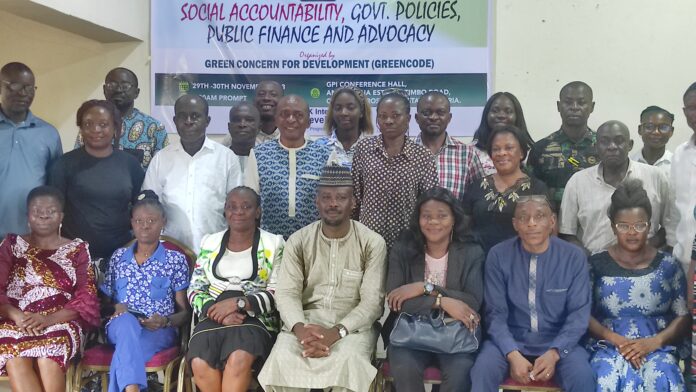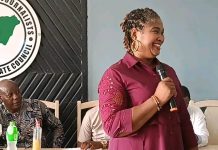…Insights from GREENCODE’s Edem Edem
Calabar – In the wake of the recent elections in Nigeria, Cross River state is witnessing a surge in civil society activism, driven by a commitment to ensuring that the government places the people at the forefront of development. This commitment echoes the ‘People’s First’ policy of the new government. Green Concern for Development (GREENCODE) is taking the lead with its Mobilising CSOs and Citizens for Social Accountability (MoCCSA) Project, funded by the Nigeria Civil Society Situation Room on Election Matters NEGROIDHAVEN can report.
Edem Edem, the National Coordinator of GREENCODE, shed light on the essence of the project during a Two Days Capacity Building Training for CSOs on Social Accountability, Government Policies, Public Finance, and Advocacy in Calabar. According to Edem, the project is a response to the ‘People’s First’ policy, aiming to equip civil society with the tools needed to engage constructively with the government. The focus is on social accountability, ensuring that citizens actively contribute to policy discussions.
Edem stated, “The essence of this is to help civil society understand simple social accountability tools, advocacy skills, to get things done for people in the grassroots.”
The project involves advocacy visits to government ministries, live Phone In Radio programme, developing Policy brief on key developmental concerns or on critical policy implementation feedback by citizens, emphasizing citizen participation in policy formulation including Public Finance Management, engagement the state budget formulation and monitoring upon approval, printing and distribution of 2024 citizens budget. Edem stressed that consultations and collaboration between the government and civil society are crucial to achieving the ‘People’s First’ vision. By gathering information from communities and presenting it to the government, civil society becomes a vital link in the governance process.
He highlighted, “Government exists for the people, and the essence of government is to provide social services and security for the people… The trend about social accountability is to make sure that government is accountable to the people.”
In a bid to provide a detailed framework, the MoCCSA Project has outlined specific goals, including improving CSOs’ knowledge of government policies and public finance management processes and fostering collaboration among CSOs, citizens, and state actors for effective oversight of social service delivery. The project in implemented by Green Concern for Development (GREENCODE) in partnership with the Nigeria CSO Situation Room on Election Matters and Policy and Legal Advocacy Centre (PLAC) and funded by Foreign, Commonwealth and Development Office (FCDO)/UKAID.
The workshop had 35 Civil Society Organisations (CSOs) in attendance, the CSO cut across key social sectors such as Education, Health, Public Finance, Persons with disability, Agriculture etc.
In his opening remark- he laid emphasis on the rationale for training CSOs on Social Accountability- thus effective social accountability contribute to better public services provision by building a stronger sense of citizens and promoting civic empowerment.
Other presenters talked on Concept of Social Accountability, Budgeting for Accountability – Overview/Analysis of Cross River State 2024 Budget. Right Based Budgeting, Cross River State Development Plan/Strategy and the Participation of CSOs and Citizens, Citizen’s Engagement for Enhance Social Accountability, Advocacy skills for Effective Legislative Engagement.
As par to preparing the CSOs trainees- the workshop had a group work session for each network of CSOs to develop their Social Accountability Advocacy Plan, which is aimed at guiding them in strategy engagement immediately after the training.
The workshop listed some of the key benefits of the CSOs and Citizens intensifying advocacy and actions on social accountability- among them were-
Increased awareness of and interest in citizens’ roles in more accountable governance, Increased capacities to engage in accountability work, Increased accountability engagements with government, Coalitions and networks strengthened, Increased partnerships with media, similarly on government part- Increased recognition of the value of contributions of citizens and CSOs and the need to involve them in governance processes, Increased responses to citizen demands, Reform of systems and procedures of government, Introduction of corrective actions.
As Cross River state navigates the dynamics of a new government, the MoCCSA Project stands as a beacon for civil society, arming them with the tools needed to actively participate in governance and ensure that the ‘People’s First’ policy translates into tangible development for the people.’ Some of the Social Accountability tools for deployment by the CSOs and citizens were; The Community Score Card (CSC), Participatory Budgeting, Independent Budget Analysis, The Public Expenditure Tracking Survey (PETS), Social Audit, Public hearings, Citizen Report Cards (CRCs), Information Campaigns, Community radio, Citizen’s charter
Also in attendance were Directors from Cross River Department of Budget and monitoring and State Planning Commission.










